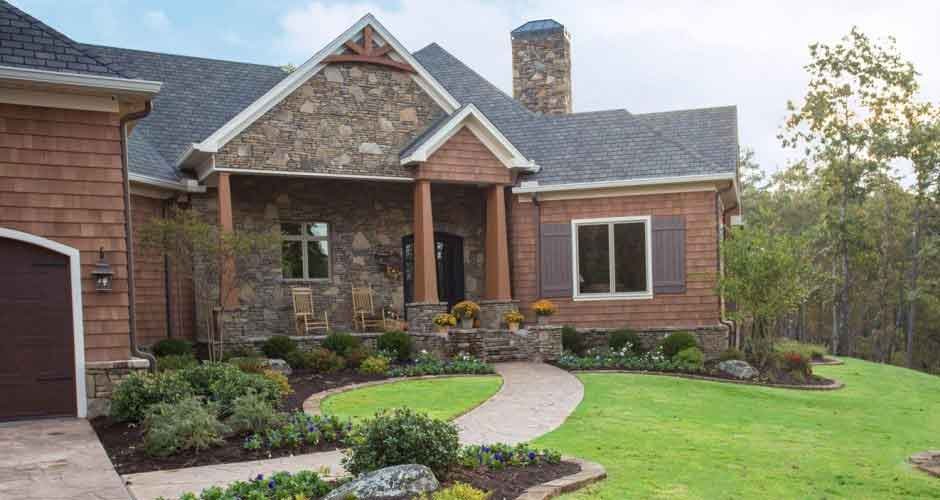Landscaping is a crucial aspect of a property’s overall appeal and can significantly impact its market value. Beyond enhancing curb appeal, a well-designed and maintained landscape can offer a range of benefits that directly influence property values. We will explore the multifaceted role of landscaping in determining property value.
How does landscaping affect the property value?
1. Curb Appeal and First Impressions
One of the most immediate and tangible ways landscaping affects property value is through curb appeal. When potential buyers or appraisers approach a property, they first see the landscape. A well-manicured lawn, thoughtfully designed flower beds, and healthy trees and shrubs create a positive first impression. This initial attractiveness can set a favorable tone for the rest of the property tour and leave a lasting impact on potential buyers.
2. Increased Aesthetic Value
Landscaping contributes to the overall aesthetics of a property, making it more visually appealing. A thoughtfully planned landscape with various plants, colors, and textures can create a harmonious and inviting environment. Beautiful landscapes are enjoyable for homeowners and make the property hold out in a competitive real estate market. The more visually appealing a property is, the more likely it is to command a higher selling price.
3. Environmental Benefits
A well-maintained landscape offers several environmental benefits that can indirectly influence property value. Mature trees, for instance, provide shade and reduce cooling costs in hot climates, making the property more energy-efficient. Landscaping also assists with stormwater management by preventing erosion and reducing runoff. These eco-friendly features can make a property more attractive to environmentally-conscious buyers and may even save costs over time.
4. Privacy and Outdoor Living Spaces
Landscaping can create private and comfortable outdoor living spaces, which are increasingly sought after by homeowners. Features like well-placed trees, hedges, or fences can offer privacy from neighbors and street noise, allowing residents to enjoy their outdoor spaces in peace. Homes with well-designed outdoor living areas, such as patios, decks, or gardens, are often valued higher as they extend the usable square footage of the property and provide additional recreational space.
5. Property Maintenance
A well-landscaped property is often associated with better overall maintenance. Buyers are more likely to assume that homeowners who care for their landscape also maintain the interior of the property diligently. This perception can positively influence their willingness to pay a higher price for the property, as they expect fewer hidden maintenance issues.
6. Energy Efficiency
Strategic landscaping can improve a property’s energy efficiency, which can be a selling point for eco-conscious buyers. Trees and shrubs strategically planted to block harsh winds in the winter or provide shade in the summer can reduce heating and cooling costs. Energy-efficient homes are often more appealing and can command higher prices in the real estate market.
7. Economic Factors
Landscaping can influence economic factors that affect property value. For instance, a well-landscaped property can reduce the time a property spends on the market. Homes with attractive landscapes tend to sell faster than those without, potentially saving sellers carrying costs and reducing the need for price reductions.
8. Appraisal and Market Value
Appraisers regard landscaping when assessing a property’s value. They take into interpretation factors like the quality of the lawn, the condition of trees and shrubs, the presence of irrigation systems, and the overall design of the landscape. Appraisers assign a specific value to the landscaping, which is factored into the property’s appraised value. Therefore, a well-maintained and thoughtfully designed landscape can lead to a higher appraised value, ultimately influencing the property’s market value.
9. Return on Investment (ROI)
Landscaping can supply a substantial return on investment. According to the National Association of Realtors (NAR), well-landscaped homes can have a sales price that is 5.5% to 12.7% higher than homes with minimal or no landscaping. This ROI is due to the positive impact on property value, curb appeal, and overall marketability. Additionally, landscaping is a relatively affordable home improvement project compared to major interior renovations, making it an attractive option for homeowners scrutinizing to increase their property’s value.
10. Maintenance Costs and Effort
While landscaping can enhance property value, evaluating the ongoing maintenance costs and effort associated with it is paramount. Neglected landscapes can have the opposite effect, decreasing property value. Overgrown, unkempt lawns and neglected plantings can give the impression of a poorly maintained property, ushering to lower appraisals and a decreased market value.
Professional landscaping in Kissimmee plays a multifaceted role in determining property value. From improving curb appeal to enhancing environmental benefits, creating outdoor living spaces, and contributing to a neighborhood’s overall appeal, the impact of landscaping on property value cannot be overstated. Homeowners should view landscaping as an investment, considering both the short-term benefits of increased curb appeal and the long-term advantages of higher property values. To maximize these benefits, it’s essential to maintain and invest in landscaping thoughtfully, ensuring it remains a valuable asset to the property.






